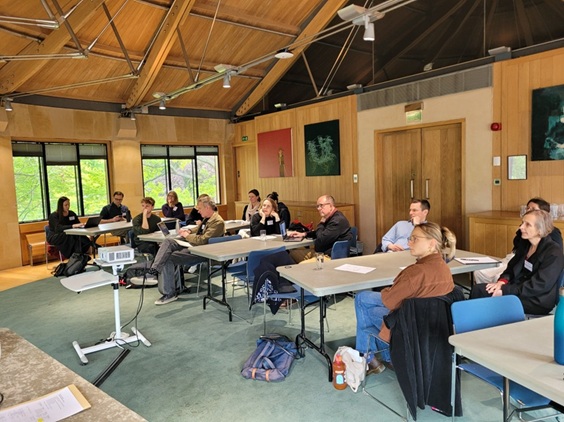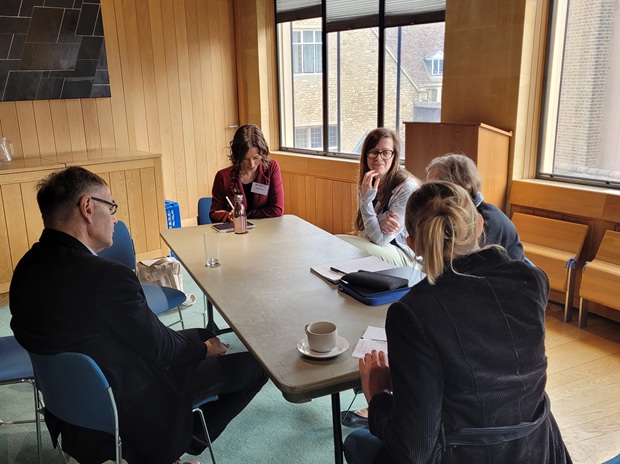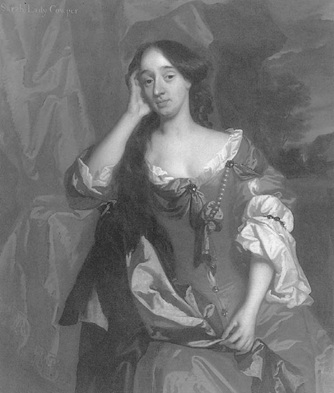The third Memory Club meeting took place on Thursday 8 May 2025. It focused on the theme of memory and ageing.

?
Photograph © Martha McGill.
Helena Gellersen opened the proceedings with a talk about how memories vary over the course of the lifespan. Memory gets poorer with age, but not necessarily because we forget more or have greater difficulty in accessing memories. Rather, older people tend to recall fewer details than younger people. This decline in memory precision begins in midlife and is particularly marked in people with a family history of dementia. However, older people still rate their memories as vivid. The subjective experience of vividness, seemingly, does not equate to the number of details remembered.
The next talk was by Kasia Boddy, who spoke about her research on the novelist Lore Segal (1928-2024). Segal explored the role of community in memory formation, discussing how family and friends help us to distinguish real from fabricated memories. She also took an interest in memory’s distortions, looking at how we can adopt other people’s experiences, things we have imagined or scenes from fiction as ‘memories’ of our own. Remembering becomes a kind of double exposure, in which the present is superimposed on the past.
The last talk was by PhD student Laetitia Pilgrim. She introduced Lady Sarah Cowper (1644-1720), who kept diaries from the age of 56 until 72. Cowper interpreted remembering and forgetting in a religious framework, and found both processes alternatively comforting and distressing. She obtained a measure of peace by consigning her past transactions to oblivion, but also struggled with the decay of her memory. Combined with her failing hearing, her weakening memory prevented her from attending to sermons, and combined with her dimming sight it kept her from reading. For Cowper, declining memory precision was linked to increasingly imprecise sense experience.
This theme was further explored in the ensuing discussion. It’s hard to judge whether age-related changes in memory precision are linked primarily to alterations in the cognitive processing of memories, or changes in the quality of sense perception. Hearing loss is a significant risk factor for dementia – though whether this is because of the diminished sensory inputs themselves, or a consequent reduction in social interaction, is unresolved. Participants also highlighted that there may be differences in memory precision between individuals according to the affective intensity of memories, or how much value people attach to remembering.
The second half of the session was devoted to preparation for our upcoming hackathons. The hackathons will play a crucial role in the project, underpinning the design of a behavioural study and an MRI experiment exploring vivid memory. The format was introduced by project team member Charles Fernyhough, who used hackathons in a previous funded project, Hearing the Voice. There are challenges involved in bringing together academics from varied disciplines to design experiments. Many participants will not have a clear sense of what is or isn’t feasible, resulting in over-ambitious or otherwise impractical final proposals. At the same time, bringing in fresh perspectives can significantly enrich experiment design.

?
Photograph © Martha McGill.
Preliminary discussions followed. Groups explored the methodological challenges of assessing vividness, and questioned how to approach the discrepancy between what people experience as vivid and how they report on those experiences. There was also debate about how to investigate the social and collaborative nature of memory, and the cultural frameworks that influence what we remember and how. These initial conversations will provide a backbone for the discussion at our next meeting – the first of the two hackathons.
